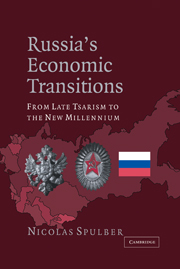Book contents
- Frontmatter
- Contents
- Figures and Tables
- Preface
- PART I THE TSARIST ECONOMIC TRANSITION
- PART II THE SOVIET ECONOMIC TRANSITION
- PART III THE POST-SOVIET ECONOMIC TRANSITION
- 19 The Socioeconomic Framework
- 20 The Transition Issues
- 21 The Economic Policies
- 22 The Problems of Agriculture
- 23 The Industrial Changes
- 24 Domestic and Foreign Trade
- 25 Money and Banking
- 26 State Finance
- 27 Overall View
- Index
21 - The Economic Policies
Published online by Cambridge University Press: 03 December 2009
- Frontmatter
- Contents
- Figures and Tables
- Preface
- PART I THE TSARIST ECONOMIC TRANSITION
- PART II THE SOVIET ECONOMIC TRANSITION
- PART III THE POST-SOVIET ECONOMIC TRANSITION
- 19 The Socioeconomic Framework
- 20 The Transition Issues
- 21 The Economic Policies
- 22 The Problems of Agriculture
- 23 The Industrial Changes
- 24 Domestic and Foreign Trade
- 25 Money and Banking
- 26 State Finance
- 27 Overall View
- Index
Summary
Agricultural Policy
The primary objective of the leader of the Russian Federation after the collapse of the USSR was to devise the set of policies that would ensure the transition to the market. The key instrument of this transition was the methodic change of the pattern of ownership in the primary, secondary, and tertiary sectors, that is, the privatization of state property. How did the privatization powers affect the decollectivization of agriculture, the right to sell and purchase land, the prices of agricultural products, and the upstream and the downstream connections of agriculture with other sectors?
First, it should be noted that the privatization of agriculture was carried out in a sui generis fashion. Three state committees were involved in this field: The State Land Committee became responsible for all land privatization; the Ministry of Agriculture was in charge of the privatization of all non-land assets; and finally, the State Management of State Property was responsible for preparing legal documents as well as for privatizing the upstream and downstream industries connected with agriculture. During the first stage of this process, from 1991 to 1993, the legislation concentrated on establishing procedures for determining land and non-land entitlements. During the second stage, from 1994 to 1996, the emphasis shifted to ensuring that the holders of entitlements knew their rights and were able to dispose of them properly.
- Type
- Chapter
- Information
- Russia's Economic TransitionsFrom Late Tsarism to the New Millennium, pp. 317 - 328Publisher: Cambridge University PressPrint publication year: 2003



